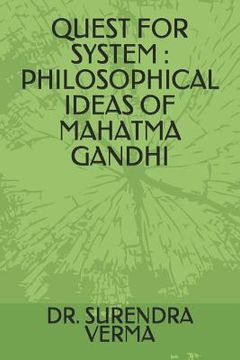Reseña del libro "Quest for System: Philosophical Ideas of Mahatma Gandhi (en Inglés)"
Preface ----------- Gandhi never tried to give us a systematic philosophy of his own, but he drank deep from the fountain of Indian thought, and endeavoured to follow the masters of Indian Philosophy. In the formation and development of his basic ideas Gandhi is very much influenced by Hinduism, Jainism and Buddhism. Besides, it should also be remembered that he was also familiar with the best that Europe and America have produced. He quotes Thoreau, admires Mazzini and reads Carpenter. Ruskin helps in giving shape to Gandhi's social and political ideas. Gandhi never claims any originality he is a follower of great monistic and idealistic traditions. The key concepts of Gandhian thought are truth and non-violence. Truth is the ultimate goal to achieve, and non-violence is the means to achieve it. The two are inseparable. Truth can be realized only the non-violent way and there is no dichotomy between the end and the means. Truth for Gandhi is the ultimate law of "everything and every being." However there is a distinction between Absolute Truth and relative truths. Though the only Reality is the Absolute Truth, relative truths are not unrealities. They are partial, temporal truths. They are the "fleeting glimpses of Truth." As long as one has not realized the Absolute truth the relative truths must meanwhile be one's "shield and buckler." Gandhi realized the power of truth and called it Satyagraha. Satyagraha is "soul force pure and simple." It is the force implied in truth, it is also force which is born of truth and love or, say, non -violence. Gandhi used this concept of Satyagraha as a technique to fight social injustice. Gandhi's attitude is utterly practical. He found injustice everywhere in the society. He pondered over the issue of injustice and tried to find a way out. He suggested non -violent resistance to injustice as the only practical and human way to fight against the socio-political wrong. Non-violent resistance is not 'non- resistance'. It rather commands us to 'do' something against evil; it does not recommend toleration. "It means pitting one's whole soul against the will of the tyrant." Satyagraha is a type of warfare in which the so-called 'enemy' is not regarded as enemy but is regarded as a 'possible friend' with whom one can be at peace. Gandhi's concept of peace is not only dynamic but is also positive. It is not merely a state of 'no-war' it presupposes a pattern of cooperation and integration between the parties. Gandhi emphasises love, friendliness and charity as necessary components in the anatomy of peace. Where there is peace there is complete absence of violence. Cooperation and friendliness are the integral parts of real peace. Gandhian concern for values is well-known and the values cherished by Gandhi are all ingrained in the philosophical tradition of India. In India we speak of dharhm, arhth, kām tathā moksha. These are objects of interest. There are moral interests, economic and political interests, and psychological interests. All these interests are ultimately directed towards moksha, which is the ultimate goal of man. Gandhi recognizes moksha as the ultimate goal, but his interest was mainly in common man and his socio-political activities. Desires of man and his socio-political interests are not values in themselves. They become valuable only when they are morally pursued .Thus moral category, dharma, stands a-part .One of the great contribution of Gandhi was to introduce dharma in socio -political affairs. Gandhi says, ''politics bereft of religion are absolute dirt even to be shunned." Our desires and socio-economic and political activities, if morally are not correct, the loose their valve and become 'dis-value'. Gandhi never tried to systematize his philosophical thoughts. Hence is the quest for system. It is a humble attempt to systematize his thoughts in the papers which are collected in this book.

